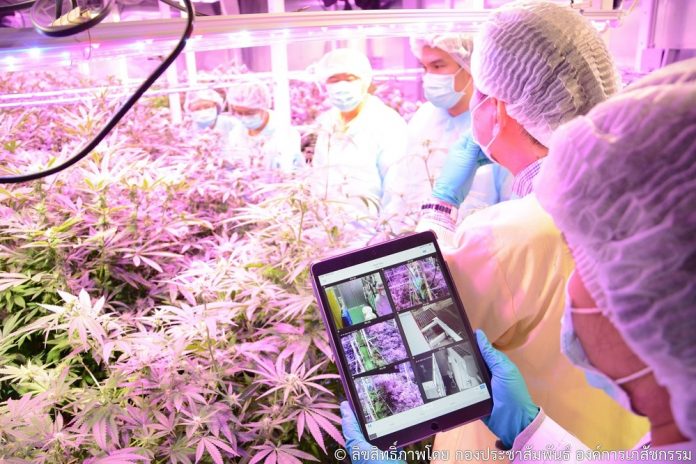CANNABIS TO TAKE ON CANCER CELLS IN NEW EXPERIMENTS
Under the current scientific consensus, there is no scientific evidence that cannabis cures cancer. Alleviating negative side effects of cancer treatment maybe, but not curing cancer directly.
Now, equipped with modern laboratory facilities and freshly provided with scarce cannabis medicines, the National Cancer Institute (NCI) is resolved to find out from its own experiments to test that long-held conclusion, to either confirm or disprove it.
On August 7, the first lot of cannabis medicinal formulas—4,500 5cc bottles of THC oil—were delivered by the Government Pharmaceutical Organization to the Ministry of Public Health who was passing them on to the Department of Medical Services (DMS) and ultimately to the NCI.
Six hundred bottles of this lot, with high concentration of the strong psychoactive anti-inflammation THC component, will at once be headed straight to the NCI’s state-of-the-art sophisticated laboratories for cancer R&D.
Attack on Cancer
A hundred of the 600 bottles of the THC oil have been put aside for experiments to be conducted in test tubes to determine once and for all whether cannabis can kill cancer cells, diminish them, halt their reproduction, and stop the growth of a cancerous tumor.
The cancer research program has been designed to attack cancer cells squarely in the hope that cannabis can contribute in some ways to an effort to eradicate those malignant cells.
Ten types of cancer are targeted, including lung cancer, liver cancer, ovarian cancer, breast cancer and pancreatic cancer, common among Thais.
The remaining 500 bottles of THC oil will be used on lab animals with the same purpose of confronting cancer cells head on.
Chemotherapy Side Effects
After taking away 600 of the 4,500 bottles that have been delivered to the health ministry, the great majority of the first lot: 3,900 bottles of THC oil will be destined for clinical trials on real cancer patients at the NCI and its 12 affiliated hospitals in a volunteer research program.
The aim for this 3,900-bottle bunch differs from the first 600 bottles: They won’t be used to try to cure cancer and eliminate cancerous cells, but more realistically to treat symptoms of last-stage cancer, such as pain that deprives the patients of their quality of life.
They will also be used to mitigate side effects of chemotherapy, namely nausea and vomiting that cause an inability to eat, and insomnia that leads to health-deprived sleepless nights.
The central database of patients and their information will then be created and kept by the NCI and DMS.
Second Lot Imminent
By the end of August, the Government Pharmaceutical Organization will focus on manufacturing and delivering to the health ministry a second lot of 2,000 bottles of its finished products—the last two of its three cannabis formulas— 500 10cc bottles of CBD oil and 1,500 5mL bottles of THC/CBD oil at the ratio of THC:CBD = 1:1—from its first harvest cultivated since March.
Yes, it took the agency five full months from planting its first cannabis plants to completing the manufacturing of its cannabis oil, using the mature flowers of those plants.
By the way, 5cc and 5mL are just the same teaspoon size—in case you took notice of the different abbreviations.
For the second lot this time around, just as most of the first lot, the CBD oil—far softer than THC in chemical properties—and the THC:CBD = 1:1 formula are also planned to be put on clinical trials on real last-stage cancer patients, and those treated with chemotherapy who report the side effects.
The combined first and second lots aggregate 6,500 bottles of THC oil, CBD oil and a mix of THC-CBD oil.
Staggering Number of Applicants
The NCI has announced a limit of 140 cancer patients, volunteering to be treated in its clinical trial, using cannabis formulas from the first and second lots.
The volunteer program is open for registration to accept cancer-patient candidates during a narrow window of two weeks from August 2 to August 15, to be screened down to 140.
As of August 13, the number of cancer patients registered ballooned to 3,138!
Certainly, the volunteers who won’t make the cut of 140 last-stage cancer patients needed for the research program will be kept on the NCI database for further help.
Drug-Resistant Epilepsy
Parts of the undelivered 2,000-bottle second lot of CBD oil and THC/CBD 1:1 product will be allocated to the DMS’s Prasat Neurological Institute and the Child Neurology Association, Thailand for treatment of severe cases of drug-resistant epilepsy.
The Institute is keen to treat five neurological illnesses under its care: epilepsy, Parkinson’s, Alzheimer’s, multiple sclerosis and neuralgia.
The big picture portrayed, last-stage cancer, drug-resistant epilepsy and drug-resistant Parkinson’s are the top three priority diseases that will have direct access to the short supply of the first two lots of 6,500 bottles of the GPO’s THC oil, CBD oil and THC/CBD oil in a special program called the Special Access Scheme.
The program is run by network hospitals under the supervision of the Department of Medical Service.




